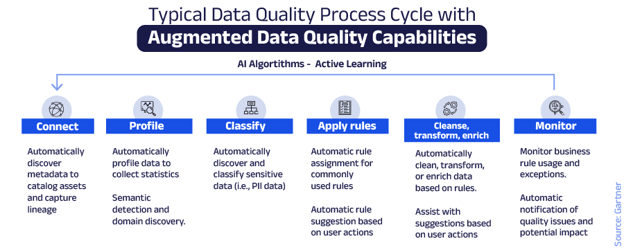The Augmented Data Quality Revolution
What is Augmented Data Quality?
Augmented Data Quality (ADQ) is a concept introduced by Gartner that represents an improved capability to evolve data quality processes through metadata, data catalogs, and AI-related technologies. According to Gartner, ADQ can enable organizations to improve insight discovery, suggest the next-best actions, and enhance accuracy in data-driven decision-making.
Augmented Data Quality represents an enhanced capability to evolve data quality processes — for improved insight discovery, next-best-action suggestions, and accuracy — through the use of metadata, data catalogs, and AI-related technologies.
In simpler terms, ADQ is about leveraging advanced technologies to improve data quality and make it more useful for organizations. This is especially important in today's data-driven world, where businesses rely heavily on data to make strategic decisions.
Why is Augmented Data Quality so important in nowadays business landscape?
However, the question remains: why is ADQ so important? One reason is that traditional data quality processes can be slow and inefficient, relying heavily on manual effort and human expertise. ADQ, on the other hand, automates many of these processes and makes them more intelligent, allowing organizations to achieve better results in less time.
Moreover, ADQ can also help organizations unlock the true value of their data, by making it more accessible, reliable, and insightful. This can lead to better business outcomes, improved customer experiences, and a more competitive position in the market.
In summary, ADQ is a key concept for organizations that want to take their data quality processes to the next level. By leveraging metadata, data catalogs, and AI-related technologies, businesses can improve their data quality processes, and ultimately, drive better business outcomes.
6 Steps of a Typical Augmented Data Quality Process
Gartner has outlined a typical augmented data quality process consisting of 6steps that are used to improve data quality and derive more insights from data. Let's take a closer look at each of these steps.
- Connect: The first step in the augmented data quality process involves automatically discovering metadata and cataloging assets, as well as capturing lineage. This step is crucial for understanding where the data comes from, what it means, and how it relates to other data.
- Profile: The second step involves automatically profiling the data to collect statistics, as well as semantic detection and domain discovery. This step helps identify potential issues with the data, such as inconsistencies or anomalies and provides a better understanding of the data's quality.
- Classify: The third step is to automatically discover and classify sensitive data, such as personally identifiable information (PII). This step helps ensure that information is properly protected and handled in accordance with data privacy regulations.
- Apply Rules: The fourth step involves the automatic assignment of commonly used rules, such as data type validation or range checks, as well as the suggestion of rules based on user actions. This step helps ensure that data meets quality standards and is consistent across the organization.
- Cleanse, Transform, Enrich: The fifth step involves the automatic cleaning, transformation, or enrichment of data based on rules, as well as assistance with suggestions based on user actions. This step helps ensure that the data is accurate, complete, and ready for analysis.
- Monitor: The final step is to monitor business rule usage and exceptions, as well as provide automatic notification of quality issues and potential impact. This step helps ensure that data quality is maintained over time and that any issues are quickly identified and addressed.
By following these 6 steps, organizations can enhance their data quality processes and improve their ability to discover insights, make next-best-action suggestions, and increase accuracy through the use of metadata, data catalogs, and AI-related technologies.

Central Roles in the Augmented DQ Process
In an augmented data quality (DQ) process, there are four central roles: DQ Manager, DQ Engineer, Data Steward, and DQ Analyst. Each role has its own responsibilities and contributions to ensure the success of the DQ process.
- Data Quality Manager
The DQ Manager is responsible for the overall management of the DQ program. This includes defining the DQ strategy, creating and maintaining DQ policies and procedures, and ensuring that the DQ process is aligned with the organization's goals and objectives. The DQ Manager also collaborates with other departments and stakeholders to identify DQ issues and develop solutions to address them.
- Data Quality Engineer
The DQ Engineer is responsible for implementing and maintaining the technical infrastructure that supports the DQ process. This includes configuring and customizing DQ tools and software, developing automated DQ workflows, and ensuring that data is captured, stored, and analyzed in a way that supports the DQ process.
- Data Steward
The Data Steward is responsible for the quality and accuracy of specific data sets. This includes identifying and resolving data quality issues, defining and enforcing data quality rules, and collaborating with other stakeholders to ensure that data is captured and maintained in a way that meets the organization's data quality standards.
- Data Quality Analyst
The DQ Analyst is responsible for analyzing and monitoring data quality metrics and identifying areas for improvement. This includes identifying data quality issues and trends, creating and maintaining DQ reports and dashboards, and collaborating with other stakeholders to develop and implement DQ improvement initiatives.
In summary, these roles play essential parts in the augmented DQ process. Their collaboration and coordination ensure that the technical and business aspects of the DQ process are aligned, and the data quality is optimized.
Conclusion
As we've seen, Augmented Data Quality (ADQ) is a powerful concept that can help organizations unlock the full potential of their data by leveraging advanced technologies like metadata, data catalogs, and AI. By following the 6 steps of a typical ADQ process, organizations can improve their data quality, discover insights, and make more accurate decisions.
However, the success of an ADQ process depends heavily on the collaboration and coordination of key roles such as the DQ Manager, DQ Engineer, Data Steward, and DQ Analyst. These roles work together to ensure that the technical and business aspects of the ADQ process are aligned and that data quality is optimized.
At our company, we specialize in providing top-notch services to help organizations take their data quality processes to the next level. With our expertise in ADQ and our experienced team of professionals, we can help your business achieve better data quality, derive more insights from your data, and make more accurate decisions.
Don't let your data quality hold you back! Contact us today to learn more about how we can help you improve your data quality processes and drive better business outcomes.



